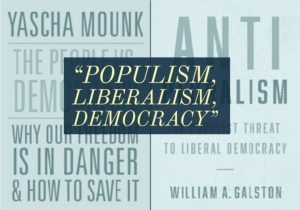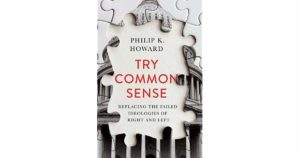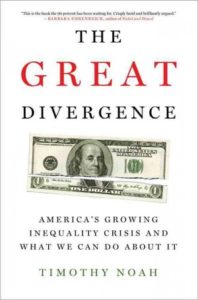 Look back a year, and remember how disquieting European politics seemed, as populist strategist Steve Bannon seemed to be on the verge of establishing The Movement, a cross-border alliance of nativist parties of the right, such as Matteo Salvini’s Northern League, The Economist notes. The scene today is rather different:
Look back a year, and remember how disquieting European politics seemed, as populist strategist Steve Bannon seemed to be on the verge of establishing The Movement, a cross-border alliance of nativist parties of the right, such as Matteo Salvini’s Northern League, The Economist notes. The scene today is rather different:
The European Parliament elections in May dashed Mr Bannon’s hopes. Mr Salvini’s Northern League did do well. But elsewhere the parties of the hard right fell back, or at best marked time. Since then, things have on the whole got worse for them. Mr Salvini is out of Italy’s government, having bungled an attempt to secure uncontested power, and has fallen back in the polls; in Hungary, Viktor Orban’s populist ruling party faces the threat of losing control of the country’s capital, Budapest, and perhaps other cities at local elections later this month. The gilets jaunes have been tamed by President Emmanuel Macron. And this week came the news that another key component of the populist right, Austria’s, has come to grief at the ballot box.

National Endowment for Democracy
Populist parties are more akin to religious sects than broad-based churches, the FT’s Simon Kuper observes:
Max Weber, the sociologist, said the crucial distinction between churches and sects was that churches normally recruit members by birth, whereas sects recruit by decision…..The anthropologist Mary Douglas wrote that a sect divides the world into two: “on one side, ourselves, our fellow members, our friends; and on the other side all the rest, outsiders.” Sects portray the outside world as “thoroughly bad”, partly to deter members from leaving, she said.
Populism’s animus…. is directed against the traditional restraining institutions they unapologetically hold in contempt, notes Kuper’s FT colleague Simon Schama:
Their undisguised aim is to shift the locus of popular sovereignty from representative institutions to an instinctive communion between charismatic leader and masses of citizens…
Quite aside from specific policies — even those as fateful as Brexit — the choice facing voters in the coming months and year is whether to put their trust in one or other version of democracy: the direct, populist version in which the leader’s version of the popular will is paramount, or representative constitutionalism in which the executive is restrained by legislative vigilance, critically scrutinised by free media and held accountable by an independent judiciary charged with upholding the universally applicable rule of law.
 Elites ignore at their own risk voters who want political accountability and more control over national borders, argues John Fund. Matthew Tyrmand, a Polish-American journalist who closely studies populist movements, told me, “Elites would do themselves a favor by realizing that they should at least address popular demand for more control over borders, the need for governmental transparency, and support for greater political accountability,” he writes for National Review:
Elites ignore at their own risk voters who want political accountability and more control over national borders, argues John Fund. Matthew Tyrmand, a Polish-American journalist who closely studies populist movements, told me, “Elites would do themselves a favor by realizing that they should at least address popular demand for more control over borders, the need for governmental transparency, and support for greater political accountability,” he writes for National Review:
But instead, in country after country roiled by populist uprisings, elites are steadfastly refusing to grapple with the legitimate sentiments of working-class voters, dissidents from politically correct identity politics, and people who feel their voices aren’t heard. So long as they choose to remain deaf, they can expect populism to continue to grow in its fervor and influence [as documented in ‘Cultural Backlash…”, above].
 Polarized politics is a formula for public failure, a downward spiral of distrust and greater paralysis. Pulling out of this spiral is difficult because polarization is good business for politicians and pundits, argues Philip K. Howard, chair of Common Good and author of the new book “Try Common Sense”. Action, not moderation, is the salve for polarization, he writes for the Hill:
Polarized politics is a formula for public failure, a downward spiral of distrust and greater paralysis. Pulling out of this spiral is difficult because polarization is good business for politicians and pundits, argues Philip K. Howard, chair of Common Good and author of the new book “Try Common Sense”. Action, not moderation, is the salve for polarization, he writes for the Hill:
Conventional wisdom is that letting individuals use their judgment will exacerbate social conflict. Evidence suggests the opposite: A study in Britain found that professionals with opposed ideological views generally arrive at similar solutions when confronting concrete problems. Studies of American judges and of German bank regulators also found remarkable consistency.
 The most richly reported part of James Traub’s book, What Was Liberalism: The Past, Present, and Promise of a Noble Idea, documents the harrowing rise of “illiberal and increasingly authoritarian leaders” in Hungary, Poland and Italy…. and recent worrisome trends in countries like the Netherlands, Austria and the United Kingdom, notes Timothy Noah, labor policy editor at Politico and the author of “The Great Divergence: America’s Growing Inequality Crisis and What We Can Do About It.”
The most richly reported part of James Traub’s book, What Was Liberalism: The Past, Present, and Promise of a Noble Idea, documents the harrowing rise of “illiberal and increasingly authoritarian leaders” in Hungary, Poland and Italy…. and recent worrisome trends in countries like the Netherlands, Austria and the United Kingdom, notes Timothy Noah, labor policy editor at Politico and the author of “The Great Divergence: America’s Growing Inequality Crisis and What We Can Do About It.”
Populists have poisoned “the cognitive or epistemological foundations of liberalism” by undermining “the very idea of truth by eliminating from it the criterion of factuality,” Traub writes. But liberals facilitated the populist resurgence by embracing globalization and the resulting exacerbation of inequality, alienating much of the white working-class.
Traub suggests that because the “discomfort with a culture in which goods, people and ideas freely circulate across the globe, upending old patterns, cannot simply be dismissed as reactionary nostalgia.” liberals must reorient themselves to the nation-state by promoting a new, positive nationalism.
 It’s no mystery what lies at the bottom of white working-class rage: Income inequality has been rising for four decades, and median income has mostly stagnated. There are many reasons, but a huge and sublimely logical part of the answer is the decline of labor unions. Noah writes for the New York Times:
It’s no mystery what lies at the bottom of white working-class rage: Income inequality has been rising for four decades, and median income has mostly stagnated. There are many reasons, but a huge and sublimely logical part of the answer is the decline of labor unions. Noah writes for the New York Times:
Liberals and the Democratic Party have remained nominally pro-union in recent decades, but their enthusiasm for rebuilding organized labor has dwindled. Why expend great effort to revive institutions that were overly adversarial and often corrupt? The answer is that at this late date, with only 6.4 percent of the private-sector work force still in labor unions, liberals can have any kind of labor movement they like. And anyway, there isn’t much choice. If liberalism doesn’t commit substantial and conspicuous energy to restoring the labor movement, it will lose all hope of reclaiming a legitimately disaffected working class. Should that occur, liberalism may really and truly die.
 That’s why the best idea in “The Stakes: 2020 and the Survival of American Democracy,” by Robert Kuttner, co-founder of the liberal journal The American Prospect, is to “restore the capacity to organize effective unions,” Noah concludes.
That’s why the best idea in “The Stakes: 2020 and the Survival of American Democracy,” by Robert Kuttner, co-founder of the liberal journal The American Prospect, is to “restore the capacity to organize effective unions,” Noah concludes.
Sensitive to “the possibility of democratic self-destruction,” the “pioneering codifiers of working liberal democracy — from James Madison to John Stuart Mill — were all agreed on the three fundamental pillars standing in the way of either Caesarist domination or majoritarian tyranny,” adds Schama:
- The first was the inviolable sovereign authority of an elected legislature, without whose consent no laws could be enacted or executed.
- The second was an independent judiciary committed to upholding the rule of law, from which no one including (and especially) the chief executive would be exempt.
- The third was the sanctity of freedom of the press and all forms of expressed opinion…. That liberty was dear to the heart of all these godchildren of the Enlightenment, not only for its duty to make distinctions between truth and falsehood but also because the expansion of knowledge was assumed to be the precondition of active citizenship in a responsible democracy.
 Portugal – a protagonist of the Third Wave of ‘democratic invention’ – is one of the few European states to prove resistant to populism, notes analyst Vincent Bevins. Politicians and political scientists here offer a set of overlapping explanations as to why the small Iberian country seems to be Europe’s least fertile ground for right-wing extremism, he writes for the Atlantic:
Portugal – a protagonist of the Third Wave of ‘democratic invention’ – is one of the few European states to prove resistant to populism, notes analyst Vincent Bevins. Politicians and political scientists here offer a set of overlapping explanations as to why the small Iberian country seems to be Europe’s least fertile ground for right-wing extremism, he writes for the Atlantic:
For one, the country has bad memories of a right-wing dictatorship that only fell in the 1974 Carnation Revolution. But there are contemporary reasons, too: Portugal’s left-wing parties have been able to maintain close ties to the country’s organized working class, a voting bloc that elsewhere in Europe has, at least in part, voted with the far right. “In this sense, the Communist Party acts as kind of a shield” against a far-right insurgence, said Pedro Magalhães, a political scientist at the University of Lisbon.
A new generation of right-wing populists in Europe and the U.S. aims to overthrow liberal democratic institutions, according to Anne Applebaum, the Washington Post columnist and Pulitzer Prize-winning historian.

Credit: New Statesman
“These populist internationals don’t want to conserve anything or preserve what exists,” she said, delivering a lecture titled “International Nationalism: The European Far-Right and the American Alt-Right,” part of the Program in the Johns Hopkins’ International Studies’ Aronson Center Speaker Series.
“Their language takes different forms in different countries but their revolutionary projects normally include the expulsion of immigrants, or at least a return to all-white or all-Dutch or all-German societies, the resurrection of protectionism, the reversal of women’s and minority rights, the end of international institutions and cooperation of all kinds,” said Applebaum, a board member of the National Endowment for Democracy, the Washington-based democracy assistance group.







